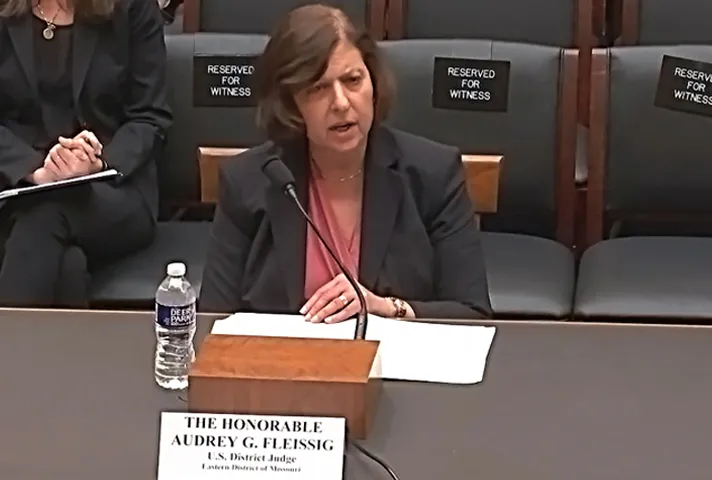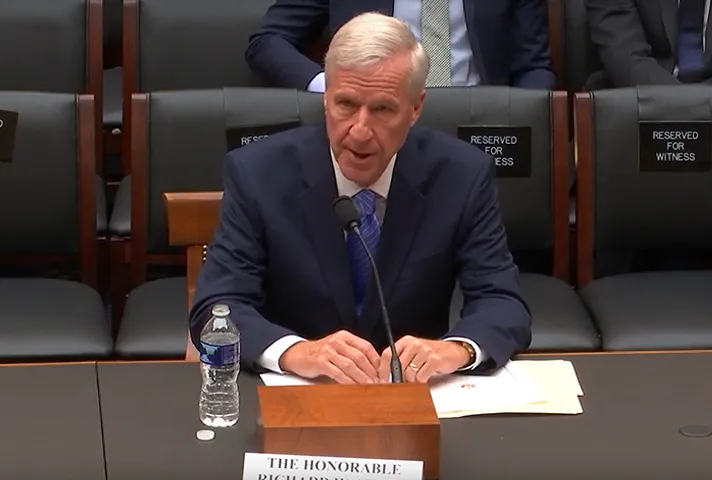Communication with Congress about Judicial Conference goals, policies, and positions forms the foundation of the Judiciary’s relationship with Congress and its committees, and enhances the Judiciary’s role as a coequal branch of government.
Congressional Hearing on Code of Conduct, Recusal, and Financial Disclosure
On June 21, 2019, the House Judiciary Committee’s Subcommittee on Courts, Intellectual Property, and the Internet held a hearing on several issues affecting the Judiciary. The topics included legislative proposals to impose a code of conduct on the Supreme Court, to require judges and justices to state their reasons for recusal in particular cases, and to require that all judicial financial disclosure reports be posted online.
James C. Duff, Director of the Administrative Office of the U.S. Courts (AO), conveyed the views of the Judicial Conference on the proposals in a letter and in conversations with the subcommittee chairman and ranking member. Duff told the subcommittee that the Judicial Conference is not the appropriate entity to administer a code of conduct for the Supreme Court and that the rest of the Judiciary already has one in place. In addition, he said that the Conference had concerns about the recusal and financial disclosure proposals. A mandate to disclose reasons for recusal could impinge on the privacy of litigants and present fairness issues in subsequent litigation, Duff said, and immediate posting of the financial disclosure reports online could raise serious security issues for judges. Federal law allows judges to redact security-sensitive information from their reports before they are made public.
Congressional Hearing on Court Records and Cameras in the Courtroom

Judge Audrey G. Fleissig testifies before the House Subcommittee on Courts, Intellectual Property, and the Internet.
On Sept. 26, the House Judiciary Committee’s Subcommittee on Courts, Intellectual Property, and the Internet held a hearing on public access to court records and restrictions on cameras in federal courtrooms. Testifying on behalf of the Judicial Conference were Judge Audrey G. Fleissig, chair of the Judicial Conference’s Committee on Court Administration and Case Management, and Judge Richard W. Story, of the Northern District of Georgia.
Judge Fleissig, of the Eastern District of Missouri, responded to proposals that the Judiciary eliminate fees for court records obtained through its online Public Access to Court Electronic Records (PACER) service. She shared that the user-based funding approach has worked well. Most users pay little or no fees for records; court opinions are always free of charge; and most of the $140 million in annual revenue to pay for the service comes from large commercial enterprises, such as financial institutions, that aggregate the data for analysis and resale. PACER can’t be made entirely free to users without a replacement source of revenue, one that does not unduly hinder access to justice by shifting the costs to litigants through higher filing fees, Judge Fleissig said.

Judge Richard W. Story testifies before the House Subcommittee on Courts, Intellectual Property, and the Internet.
Judge Story testified that the Judiciary “has a long history of fostering transparency and accountability” and that every step of the process is open to the public “with certain very limited exceptions.” Courts must protect personal information, the names of minors, and trade secrets. Judges sometimes must weigh the public’s access rights with litigants’ rights to a fair forum. For example, Judge Story said, a litigant should not have to jeopardize a competitive position in the market to adjudicate a patent lawsuit.
Addressing the issue of cameras in courtrooms, Judge Fleissig said that the Judiciary has frequently considered and studied the issue, including a three-year pilot project allowing cameras in some courts. The Judicial Conference concluded that the presence of cameras adversely affected the behavior of attorneys, witnesses, and jurors, inhibiting the courts’ ability to ensure a fair trial to all parties in a case.
Changes in Bankruptcy Law
Congress considered several changes in bankruptcy law during 2019. Some of them were passed and signed into law, including the following:
- In August, Congress passed and the President signed bills that exempt some veterans’ benefits from being treated as income in Chapter 7 bankruptcy proceedings and provide debt relief to National Guard members and reservists.
- A bill to increase the aggregate amount of debt a farmer may incur to qualify as a family farmer for purposes of a Chapter 12 bankruptcy action was passed and signed into law in August.
- The same month, the President signed into law the Small Business Reorganization Act of 2019, which increases a debtor’s ability to negotiate a successful reorganization and retain control of a business in a Chapter 11 bankruptcy.
Bills to make student loan debt dischargeable in bankruptcy cases were sponsored by Assistant Senate Minority Leader Richard Durbin, of Illinois, House Majority Whip James Clyburn, of South Carolina, and Sen. Elizabeth Warren (D-Mass.). No action was taken on the bills in 2019. Legislation aimed at preventing the payment of erroneous, false, or repeat claims for compensation from asbestos bankruptcy trusts was sponsored by several lawmakers but no action was taken in either chamber.
At its March meeting, the Judicial Conference approved a legislative proposal to place a five-year statute of limitations on claims on accrued, unclaimed bankruptcy funds. Creditors would no longer be able to petition the court for a claim after the five-year period.
Judiciary Seeks Crime Legislation
On behalf of the Judicial Conference, AO Director Duff relayed draft legislation to Congress containing several Judicial Conference priorities in criminal matters. Included was a bill to give federal probation officers authority to arrest third parties who attempt to impede them in the course of their official duties, such as searching an offender’s residence. Other provisions would:
- Reduce unnecessary pretrial detention for low-risk defendants,
- Streamline victim notification,
- Improve criminal fine collection, and
- Address wasteful and unjust effects of mandatory minimum sentences.
PACER Bill
Legislation was introduced in the House and Senate to require the Judiciary to provide free access to its online Public Access to Court Electronic Records (PACER) service. Currently, PACER is fee-based.
The vast majority of its revenue, however, comes from 2 percent of users – large financial institutions, law firms, and major commercial enterprises that aggregate large amounts of data for analysis and resale. Most other PACER users pay little or no fee because documents are free unless a user incurs a certain amount of charges in a given quarter. In 2019, the Judicial Conference raised the fee threshold from $15 per quarter to $30 per quarter, which means that as of January 2020, no fee is charged unless a user incurs at least $30 in fees in a single quarter. Court opinions are provided free. The system charges 10 cents per page for other documents. Litigants and attorneys receive free copies of all the documents in a case.
Within two years of enactment, both the House and the Senate bills would require (a) consolidation of the Judiciary’s Case Management/Electronic Case Files (CM/ECF) system into a single document management system for all federal court filings, (b) the capability for state courts to participate in the consolidated system, and (c) all filings in PACER to be text-searchable and machine-readable.
Neither bill authorizes any additional Judiciary appropriations to offset the loss of approximately $140 million in annual PACER fee revenue or for the tens to hundreds of millions of dollars in likely development and implementation costs for system-wide technology upgrades and associated operational changes. In 2019, the Judiciary began relaying its many concerns about the bills to key members of Congress and their staffs.
Congress decided in 1991 that the funds needed to provide electronic access to court information were to be provided by the users of the information through reasonable fees rather than by all taxpayers through appropriated funds. The Judiciary continues to advocate for this model of financing rather than the proposed changes in the bills.
Ninth Circuit Restructuring
Bills to divide the Ninth Circuit were introduced in 2019. Some members of Congress say that because of its geographic size, administrative needs, and case management burdens, the Ninth Circuit should be divided into smaller circuits. Some proposals would authorize additional judgeships as part of a restructuring. The Judicial Conference has not taken a position on the legislation, but has said it would oppose restructuring if it were inadequately funded. It also opposes linking its caseload-based requests for new judgeships to a restructuring of the circuit.
Annual Report 2019
- Annual Report 2019
- Funding/Budget
- The Courts and Congress
- The Federal Bench
- Accountability and Resource Management
- Facilities and Security
- Public Outreach
- Court Operations and Case Management
- Defender Services
- Probation and Pretrial Services
- Human Resources
- Information Systems and Cybersecurity
- Recent and Proposed Amendments to Federal Rules
- In Profile
